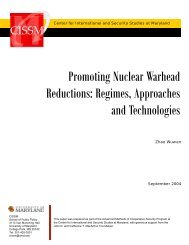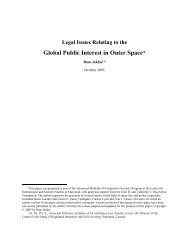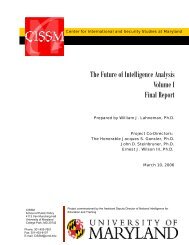A Reassurance-Based Approach to Space Security - Center for ...
A Reassurance-Based Approach to Space Security - Center for ...
A Reassurance-Based Approach to Space Security - Center for ...
- No tags were found...
Create successful ePaper yourself
Turn your PDF publications into a flip-book with our unique Google optimized e-Paper software.
The Logic of a <strong>Reassurance</strong>-based RegimeAs we have seen, the OST and other early rules <strong>for</strong> space security were developed <strong>to</strong>help stabilize terrestrial deterrence by providing two types of space reassurance: reassurancebetween the superpowers that they would <strong>to</strong>lerate each other’s use of space <strong>for</strong>reconnaissance and other “stabilizing” military support activities and would <strong>for</strong>ego highlydestabilizing <strong>for</strong>ms of space competition; and reassurance <strong>to</strong> other countries that the mostadvanced space-faring states would not try <strong>to</strong> lock out less developed countries from spacebut would share the benefits and show due regard <strong>for</strong> others’ current and future spaceinterests. In recent years, the United States has veered from this course and tried <strong>to</strong> establisha two-tiered set of rules <strong>for</strong> space security in which it, as the world’s sole superpower,claimed almost complete freedom <strong>to</strong> use space <strong>for</strong> maximum national military and economicadvantage, and could decide which other countries’ uses of space were <strong>to</strong> be <strong>to</strong>lerated andwhich needed <strong>to</strong> be controlled, negated, or denied. This conception of comprehensive U.S.military space dominance has proven <strong>to</strong> be technically and economically unfeasible, as wellas politically unacceptable <strong>to</strong> all other countries with space ambitions. But it remains anopen question going <strong>for</strong>ward whether a more appropriate guiding principle <strong>for</strong> space securitywould be an updated and strengthened <strong>for</strong>m of reassurance or an extension of deterrencefrom terrestrial conflict in<strong>to</strong> the space environment.Some analysts, such as Bruce MacDonald and a group organized by the U.S. AirForce Academy’s Eisenhower <strong>Center</strong> <strong>for</strong> <strong>Space</strong> and Defense Studies, have proposed thatdeterrence should become the central principle <strong>for</strong> space security policy. 34 At first glance, itwould seem logical <strong>to</strong> extend terrestrial deterrence in<strong>to</strong> space given that the United Statescan no more s<strong>to</strong>p other countries from acquiring advanced military space capabilities orrender its own space assets invulnerable than it can preserve its nuclear monopoly orphysically prevent a nuclear attack. Anyone who credits deterrence with preventing asuperpower conflict during the Cold War has reason <strong>to</strong> hope that an adapted <strong>for</strong>m ofdeterrence could prevent attacks in space, <strong>to</strong>o. Certainly, space deterrence would betechnically more feasible and politically more acceptable than comprehensive U.S. spacedominance has proved <strong>to</strong> be. Yet, there are a number of reasons why deterrence should notbe enshrined as the new principle <strong>to</strong> guide space security policies, acquisition programs, andinteractions among space-faring states. 35The central problem with nuclear deterrence holds true with space deterrence, <strong>to</strong>o.How does a country convince a potential adversary that it has sufficient invulnerable militarycapabilities (in space or in other environments) <strong>to</strong> ensure that any benefits that the potentialadversary might expect <strong>to</strong> gain by attacking would be outweighed by the costs of theresponse, without the first country building up its offensive capabilities <strong>to</strong> the point wherethey make the relationship more adversarial than it already is, provoke a pre-emptiveresponse, cause another type of inadvertent deterrence failure, or generate a wasteful arms34 Roger G. Harrison, Deron R. Jackson, and Collins G. Shackel<strong>for</strong>d, “<strong>Space</strong> Deterrence — the DelicateBalance of Risk,” in <strong>Space</strong> and Defense (<strong>for</strong>thcoming).35 McDonald and the Eisenhower <strong>Center</strong> group are making recommendations <strong>for</strong> U.S. space policy; they donot consider the consequences <strong>for</strong> the U.S. or the rest of the global space community if other countries alsoreorient their policies <strong>to</strong> emphasize space deterrence.23







